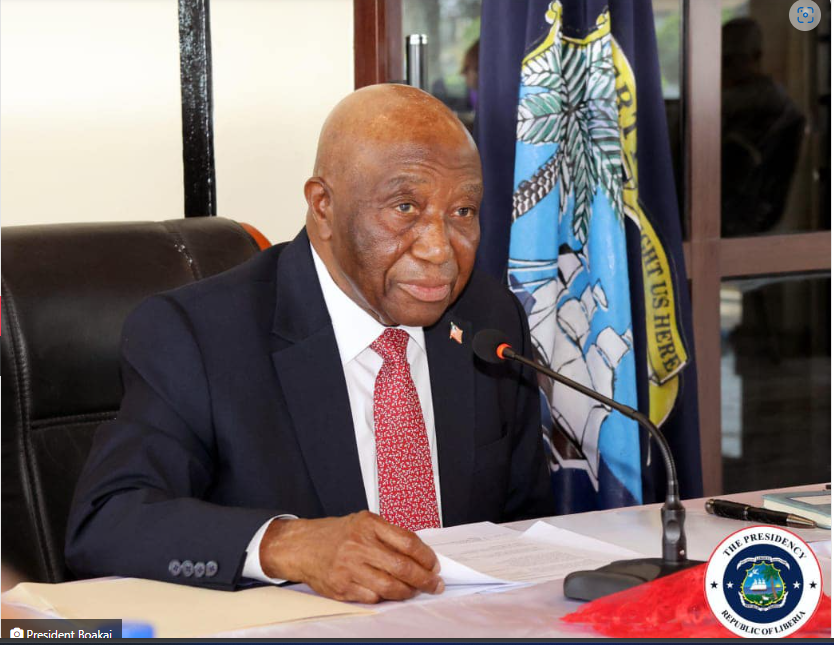Pres. Boakai Issues First Veto --Returns Port Sector Bills for Legislative Reconsideration

In his first exercise of veto authority since assuming the Presidency, His Excellency Joseph Nyuma Boakai, Sr., has formally returned two key Senate enrolled bills on maritime and port sector reform to the Liberian Senate for reconsideration. The President's decision was conveyed in an official communication dated July 15, 2025, addressed to Senator Nyonblee Karnga-Lawrence, President Pro-Tempore of the Liberian Senate. The two bills in question are: Senate Enrolled Bill No. 4 Liberia Ports Authority Act; Senate Enrolled Bill No. 5 Liberia Sea and Inland Ports Decentralization and Modernization Act. The bills, which were passed by the Legislature during the Second Session of the 55th National Legislature, sought to advance the government’s decentralization agenda by dissolving the existing National Port Authority (NPA) and replacing it with a more localized, autonomous port management structure. The primary aim of the two interrelated bills was to reform Liberia’s maritime and port governance by: Creating autonomous management structures for the four major ports of Monrovia, Buchanan, Greenville, and Harper; Establishing a new independent regulator known as the Liberia Sea and Inland Ports Regulatory Authority; Promoting decentralization to improve efficiency, local engagement, and responsiveness to regional development needs. In his communication to the Senate, President Boakai outlined several substantive concerns necessitating the veto, including structural flaws, legal inconsistencies, governance risks, and implementation challenges: The Schedule and Attestation of the bill labeled as the “Liberia Ports Authority Act” actually referenced the Liberia Sea and Inland Ports Regulatory Authority Act, revealing a fundamental mismatch between the bill’s title and its content. Overlapping Authority: The regulatory functions assigned to the proposed new agency would directly conflict with the current statutory responsibilities of the Liberia Maritime Authority (LiMA), which already oversees maritime safety, policy, and oversight. Risk of Redundancy: If enacted, the bill would significantly curtail LiMA’s existing powers, potentially reducing the agency’s role to ship registration, which is already privatized through the Liberian International Ship and Corporate Registry (LISCR). Regulatory Overreach: The proposed agency would be empowered to enforce tariffs, regulate port infrastructure, oversee maritime law enforcement, and determine port safety an excessive consolidation of authority within a single institution, contravening norms of regulatory independence. Unclear Legal Transition: Section 409 attempts to strip LiMA of core functions without outlining a clear transition plan or securing stakeholder input, potentially disrupting maritime governance. The bills were drafted and advanced without adequate planning for transition, consultation with affected agencies, or assessment of Liberia’s obligations under international maritime agreements. There are considerable risks of institutional confusion, governance gaps, and non-compliance with international best practices. This bill is functionally inseparable from the Regulatory Authority Bill, as decentralized port authorities would require a clearly defined regulatory framework to function legally. Structural flaws in the bill include: An inconsistent table of contents; Ambiguous definitions, particularly in relation to the status of the existing NPA Act; An unwieldy 9-member board proposed for each port authority, raising concerns about administrative efficiency and cost-effectiveness President Boakai exercised his veto under Article 35 of the Constitution of the Republic of Liberia, which authorizes the President to disapprove bills passed by the Legislature and return them with objections for further deliberation. While affirming his strong support for decentralization and public sector reform, President Boakai emphasized that such reforms must be guided by legal soundness, institutional clarity, and national interest. He urged the Legislature to revisit the proposed legislation, address the structural, legal, and operational inconsistencies, and reintroduce amended versions that advance decentralization without undermining existing maritime institutions. The President reiterated his administration’s commitment to building a more inclusive, accountable, and efficient public sector, and encouraged constructive collaboration with the Legislature in refining these critical bills.


